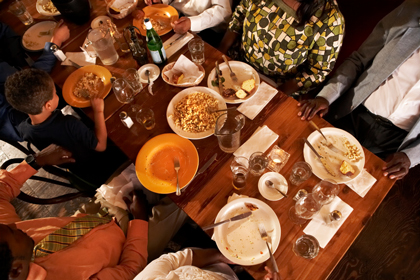 Emily Scott was one of the most energetic and creative students at the divinity school were I taught a few years ago. She is now a Lutheran pastor in New York City and part of a team starting a new ministry called St. Lydia's. Naming a church for a saint is nothing new, of course, but this congregation is not quite what you'd expect of a saintly church. It's what Emily calls a "Dinner Church." By that she means the whole worship service of this young church reaches back to the oldest of Christian traditions, which is worship at a table around a meal. First only on Sundays, but now also on Mondays, anyone who will join in comes from wherever they were wearing whatever they've got on and carrying whatever's in their hands to gather round a table. They sing a song, light candles on the table. They bless a loaf of bread in the center of the table and then share that loaf. They dip the bread in their soup and use it to clean their plates. They read a passage of scripture and she interprets the passage with a story or two. They talk about it and share stories around the circle. They hold hands and pray, read a poem, clean up, sing a song, receive a blessing, and go on their way.
Emily Scott was one of the most energetic and creative students at the divinity school were I taught a few years ago. She is now a Lutheran pastor in New York City and part of a team starting a new ministry called St. Lydia's. Naming a church for a saint is nothing new, of course, but this congregation is not quite what you'd expect of a saintly church. It's what Emily calls a "Dinner Church." By that she means the whole worship service of this young church reaches back to the oldest of Christian traditions, which is worship at a table around a meal. First only on Sundays, but now also on Mondays, anyone who will join in comes from wherever they were wearing whatever they've got on and carrying whatever's in their hands to gather round a table. They sing a song, light candles on the table. They bless a loaf of bread in the center of the table and then share that loaf. They dip the bread in their soup and use it to clean their plates. They read a passage of scripture and she interprets the passage with a story or two. They talk about it and share stories around the circle. They hold hands and pray, read a poem, clean up, sing a song, receive a blessing, and go on their way.
Each week, maybe forty in total. From that number a couple of discussion groups have formed, a movie club, and a community garden project. They'll add more meals when they can, never letting them get large enough to lose the intimacy they find in sharing their ordinary lives.
"My love of the tradition I grew up in runs deep," Emily says, "But I have also felt a craving, throughout my life, for an acknowledgement of God's presence in the ordinary, or even the profane places of my existence—the places that are not set apart with silver or lace, but instead feel raw and raggedy. Does God not find me there too? It is perhaps no coincidence, then, that the Latin root for 'profane,' profanus, means 'outside the temple.'"[1]
We talk of the "emerging" church, and the "next" church, and "fresh expressions" of church, and "missional transformations" of church. All that talk recognizes that something is profoundly changing in how God is calling us to be God's church. No question about that. Some so-called "traditional" churches will remain, of course . Some of those will remain strong and some will not. New experiments will arise, and some of them will become strong and some will not. But whether traditional or new, liturgical or "Dinner," the most faithful expressions of "church" will be what they've always been, and that's the thing that Emily Scott has rediscovered at St. Lydia's. They will be patterned, welcoming, open, rooted, reliable, tasty, song-filled, prayer-textured, friendship-allowing, love-imitating, Jesus-following circles of intimacy and experimentation. And that's even true for the big established ones, if they still want to be Christ's church. And whether small or big, old or new, they'll always remember, together, that it’s best when everyone shares in the washing up. That's church.
[1] This quote, as well as the story of St. Lydia's, comes from Emily M. D. Scott, "Holy Things for Holy People," Reflections: A Magazine of Theological and Ethical Inquiry (Yale Divinity School, Spring 2014), pp. 13-15 (quote from p. 14).








